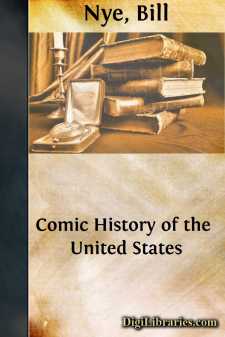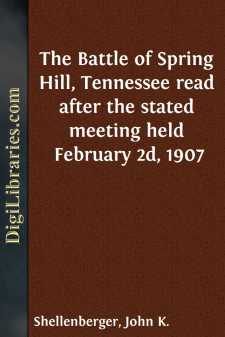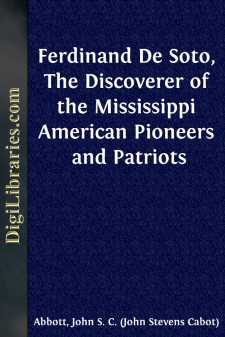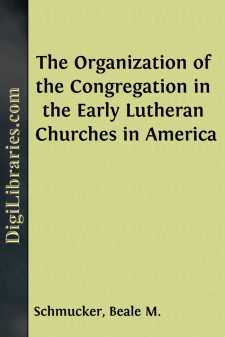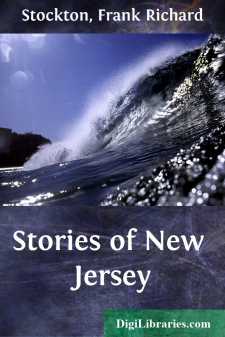History
- Africa 30
- Americas (North Central South West Indies) 50
- Ancient 68
- Asia 58
- Australia & New Zealand 8
- Canada 41
- Caribbean & West Indies 1
- Civilization 20
- Eastern Europe 12
- Europe 310
- Expeditions & Discoveries 60
- General 77
- Historical Geography 1
- Jewish 9
- Latin America 3
- Medieval 8
- Middle East 13
- Military 248
- Revolutionary 8
- Study & Teaching 5
- United States
- Western Europe 56
- World 13
United States Books
Sort by:
by:
Bill Nye
CHAPTER I. THE DISCOVERY OF AMERICA. It was a beautiful evening at the close of a warm, luscious day in old Spain. It was such an evening as one would select for trysting purposes. The honeysuckle gave out the sweet announcement of its arrival on the summer breeze, and the bulbul sang in the dark vistas of olive-trees,—sang of his love and his hope, and of the victory he anticipated in the...
more...
CHAPTER I. A ROUGH START IN LIFE. To attempt to write and publish sketches of my somewhat eventful career is an act that, I fear, entails the risk of making enemies of some with whom I have come in contact. But I have arrived at that time of life when, while respecting, as I do, public opinion, I have hardened somewhat into indifference of censure. I will, however, endeavour to write as far as lies in...
more...
MORE than twenty-five years have passed since I began to collect the materials from which this pamphlet has been evolved. As a substantial basis, to begin with, I was an eye-witness of all the fighting in the vicinity of Spring Hill, that amounted to anything, from the time Forrest attacked the 64th Ohio on the skirmish line until Cleburne's Division recoiled from the fire of the battery posted at...
more...
INTRODUCTION TO THE REVISED VOLUME. The third volume of the American Eloquence is devoted to the continuation of the slavery controversy and to the progress of the secession movement which culminated in civil war. To the speeches of the former edition of the volume have been added: Everett on the Nebraska bill; Benjamin on the Property Doctrine and Slavery in the Territories; Lincoln on the Dred Scott...
more...
Mr. Theodore Irving, in his valuable history of the "Conquest of Florida," speaking of the astonishing achievements of the Spanish Cavaliers, in the dawn of the sixteenth century says: "Of all the enterprises undertaken in this spirit of daring adventure, none has surpassed, for hardihood and variety of incident, that of the renowned Hernando de Soto, and his band of cavaliers. It was...
more...
The Organization of the Congregation in the Early Lutheran Churches in America. The Lutheran Church in this country has had an opportunity, as never before in its history, to determine for itself the whole form of its organization, uncontrolled by any external forces. In the old world the intimate and organic union of the church with the State left little liberty in this respect. When, therefore, the...
more...
The North American Indians, the earliest inhabitants of this country of whom we know anything definite, were great story-tellers; and their histories consist entirely of stories handed down from parents to children, or, more likely, from grandparents to grandchildren, for grandfathers and grandmothers are generally more willing to tell stories than fathers or mothers. And so these traditions, probably...
more...
by:
Isaac Allen
If there is one subject which, above all others, may be regarded as of national interest at the present time, it is the subject of Slavery. Wherever we go, north or south, east or west, at the fireside, in the factory, the rail-car or the steamboat, in the state legislatures or the national Congress, this "ghost that will not down" obtrudes itself. The strife has involved press, pulpit, and...
more...
by:
John Fiske
RESULTS OF YORKTOWN.Sympathy between British Whigs and the revolutionary party in America.The 20th of March, 1782, the day which witnessed the fall of Lord North's ministry, was a day of good omen for men of English race on both sides of the Atlantic. Within two years from this time, the treaty which established the independence of the United States was successfully negotiated at Paris; and at the...
more...
by:
Emerson Hough
Chapter I. The Frontier In History The frontier! There is no word in the English language more stirring, more intimate, or more beloved. It has in it all the elan of the old French phrase, En avant! It carries all of the old Saxon command, Forward!! It means all that America ever meant. It means the old hope of a real personal liberty, and yet a real human advance in character and achievement. To a...
more...


